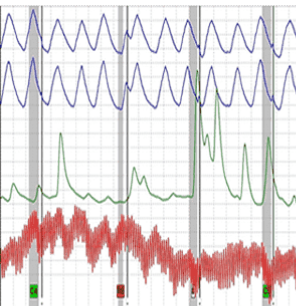Polygraph exams have been traditionally used in investigations to narrow down the suspect’s list and in criminal defense to exonerate defendants from criminal responsibility. However, these tests have since permeated other fields, including medical therapies.
Professional counselors recommend administering polygraph exams to reconcile feuding partners, foster open communication in relationships, and even combat self-destructive behaviors like pornographic addiction.
But can lie detector tests facilitate healing for individuals grappling with mental and emotional challenges?
Read below as we give more perspective to that question.

Notable Use Cases of Polygraph Tests in Therapy
Polygraph exams have become an integral part of uncovering infidelity in relationships. By administering a lie detector test, polygraphers can establish hints of promiscuity in a relationship.
Typically, a couple will be queried on whether they’ve engaged in sexual behaviors with anyone besides their partners. These could range from seemingly innocuous acts like flirting with a coworker to more overt behaviors like sexual intercourse with their exes.
The faithful partner can use the test results to reconcile with their spouse or chart a new path.
Below are other noteworthy use cases of polygraphs in relationship therapy:
1. Conducting Background Checks
Performing extensive background checks is a critical step before becoming romantically involved with someone. It provides a foreknowledge of the habits that could impact your relationship, helping to manage your expectations.
During polygraph tests, your love interest may be asked questions about their previous sex life and medical history, particularly if they’ve contracted any sexually transmitted diseases (STDs). They may also be queried on their family, career, present financial obligations, drug and alcohol habits, and social media activity.
2. Testing for Pornographic Addiction
The impact of pornographic addiction on overall health and wellness is well-documented. According to research, chronic exposure to porn can suppress the mood, lower self-esteem, and lead to depression.
Taking polygraph exams might help identify pornographic addiction in one or both partners. The tests can confirm or dispel suspicions, helping rebuild trust in a fractured relationship.
3. Tracking Other Undesirable Internet Activity
Besides pornography, many other aberrant online activities point to infidelity, including joining dating sites or sexual chat rooms. While performing cybersex may seem harmless, it can severely impact intimacy in relationships.
Taking a lie detector test can unearth a history of harmful internet activity and provide an opportunity to address the raised issues.

How Might Polygraph Tests Facilitate Healing In Therapy?
1. Dispelling Doubts
It’s only human to indulge doubtful feelings in a relationship. However, if not addressed urgently, prolonged suspicion can ruin what used to be a perfect union.
Polygraph exams can help confirm or dispel doubts about relationship partners.
By submitting to a lie detector test, partners can clear suspicions on core relationship issues like infidelity, porn addiction, and substance abuse.
2. Rebuilding Trust
Regaining trust in relationships can be extremely challenging, especially where a pattern of betrayal is involved.
If one partner has been caught in the same mistake severally, it’s difficult to accept that they’ve finally turned over a new leaf. But that’s where polygraph exams come in.
Lie detector tests assure the betrayed partner that their spouse has genuinely reformed. It also allows the betraying partner to take responsibility for their actions, setting the stage for genuine reconciliation.

3. Fostering Honesty and Transparency
Relationships that are premised on lies often crumble soon enough. However, some people are naturally inclined to stretch the truth even when it’s inconvenient.
Taking a polygraph test can encourage honesty and open communication in a relationship by discouraging compulsive liars.
When a dishonest partner knows there’s a lie detector test coming up soon, they’ll be tempered in their speech to avoid being caught in a lie.
4. Preventing the Lie Bias
Lie bias is a psychological condition developed by betrayed partners, in which the victim’s mindset readily assumes dishonesty.
Relationship partners with lie bias will always read falsehood in every act or speech. After all, they suffered betrayal from the most unlikely quarter.
Lie detector tests can help counter lie bias and restore an individual’s belief in the virtues of trust and fidelity. While a single polygraph exam may not guarantee that the examinee will never err, it provides a sense of closure and allows the partners to begin on a new slate.

Accelerating Healing With Professional Polygraph Tests
Mounting evidence indicates that lie detector tests can promote mental and emotional restoration for therapy patients. However, the success of polygraph exams depends primarily on who administers them.
To improve the outcome of lie detector tests, ensure they are conducted by a professionally trained examiner with impressive reviews from previous clients.
Select an examiner who graduated from a polygraph school accredited by reputable organizations, such as the American Polygraph Association. Since only half of the US states offer licensing, an examiner must determine where he will be operating. And, on the basis of that, an examiner should apply for a license.






